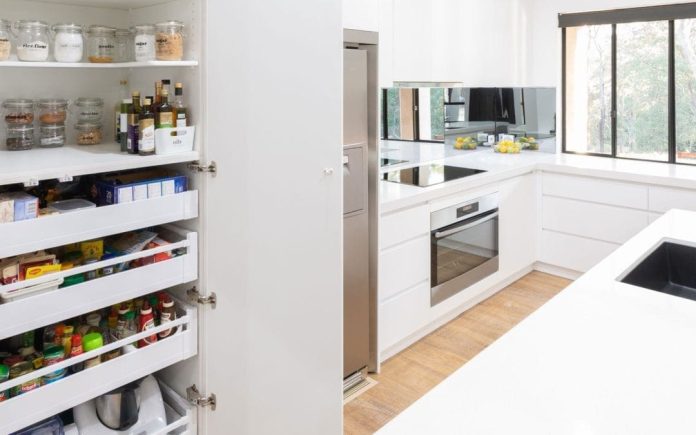Our kitchen pantry is the centre of culinary activity, where we store essential ingredients and supplies. It can, however, become a chaotic and wasteful space if not properly organised and maintained.
This article will highlight the most common mistakes that people make in their kitchen pantries and provide practical solutions for creating an efficient, organised, and food-safe pantry.
Lack of Pantry Organisation
Neglecting organisation is a common pantry mistake. When your pantry lacks a structured system, items can easily get lost, leading to duplicate purchases or expired items. The best way to deal with this issue is to categorise and separate items with shelves, bins, and baskets. Keep frequently used items at eye level, and reserve higher and lower shelves for less-used items or bulky items like pots and pans. It will be easier to find what you need when you have a clear organisational system in place, and food waste can be reduced as well.
Ignoring Expiration Dates
One of the biggest mistakes is ignoring expiration dates. There is a limited shelf life for many pantry items, such as canned goods and condiments. Health risks can also arise from consuming expired products. Check expiration dates when stocking your pantry, and use older items before newer ones by rotating first-in, first-out (FIFO). Simple habits like this will minimise food waste and ensure the safety and quality of your pantry items.
Improper Pantry Storage
Improper storage conditions can compromise the freshness and safety of your pantry items. Store grains, flour, and pasta in airtight containers to prevent moisture and pests from getting in. You should keep oils out of direct sunlight to prevent them from spoiling. Spices, on the other hand, should be stored in a cool, dark place to preserve their flavour and potency. You can preserve the quality of your pantry staples and reduce food waste by paying attention to storage needs.
Buying Too Many Food Items
You can save money by buying in bulk, but it can be a double-edged sword if you overdo it. Purchasing excessive quantities of perishable or short-life items is one of the most common mistakes. Make sure you know your consumption patterns and how much storage space you have before you buy in bulk. Don’t let food go bad before you can use it. Be realistic about your needs. Additionally, consider vacuum sealing bulk-purchased items to extend their shelf life.
Neglecting Pantry Cleaning
If left neglected, a pantry can quickly become a breeding ground for pests. Keeping your pantry clean is essential. Ensure shelves are clean, sweep the floor, and vacuum any crumbs or spills. In time, it will develop foul odours if it is not cleaned often enough. It is a wise investment to hire a professional cleaning company to refresh your pantry and home. They can thoroughly clean every nook and cranny of your pantry, ensuring that it remains free of pests and contaminants while your house shines like new. In addition to organising shelves and removing stubborn stains, they handle the dirty work so you can enjoy a well-organised pantry and a pristine living space. Having a professionally cleaned pantry and home not only promotes a healthier environment but also gives you peace of mind.
Not Labeling Containers
An excellent way to organise your pantry is to move items from their original packaging into containers. Labelling these containers is a common mistake that can lead to confusion. Make sure you label containers with the contents and the date of storage to avoid mix-ups. It will save you time in the kitchen and help you avoid mistakes.
Not Inspecting for Pests
A pantry pest infestation can wreak havoc on your food supplies. Ants, moths, and rodents are some of the most common pantry pests. Pest infestations should not be ignored. Keep an eye out for signs of vermin, like small holes in packaging or droppings. Keeping unwanted visitors at bay requires appropriate pest control methods, such as traps, repellents and, most importantly, proper food storage. Airtight containers keep food hygienic and prevent pest infestations.
Using Pantry Space Inefficiently
The most common mistake people make is wasting space in their pantry. The back of the cabinet can be difficult to access if you stack items too high or deep. Install shelves inside the door, hooks inside the door, or pull-out drawers to maximise pantry space. Having these additions allows you to use vertical and horizontal space efficiently, making it easier to reach and see what’s in your pantry.
Keeping Expired or Unused Items
One of the most common pantry mistakes is holding onto expired or rarely used items. In the long run, these items clutter your space and can even hide more essential ingredients. You can donate unopened and unused pantry items to food banks once a month to declutter your pantry. Not only does this free up space, but it also helps those in need.
Ignoring Temperature and Humidity
Temperature and humidity can affect the quality and safety of pantry items. Maintain an appropriate pantry environment. To prevent moisture-related issues like mould and spoilage, keep the pantry cool and dry. Potatoes and onions, for example, are sensitive to temperature and humidity and should be stored separately.
Not Keeping an Inventory
An organised pantry starts with an inventory of your pantry items. Whether you keep a list on your phone or a physical checklist, make sure you update it regularly. When you keep an inventory, you can avoid overbuying, plan meals efficiently, and prevent items from going unnoticed.
Conclusion
When you organise and store your pantry correctly, you’ll reduce food waste, save money, and make cooking and meal planning more enjoyable and stress-free. Put these changes into practice today for a well-maintained kitchen pantry.









